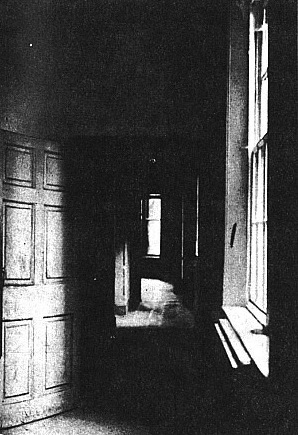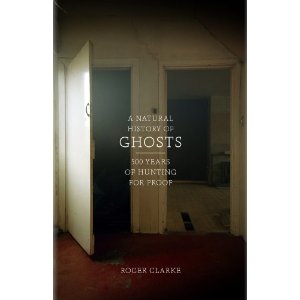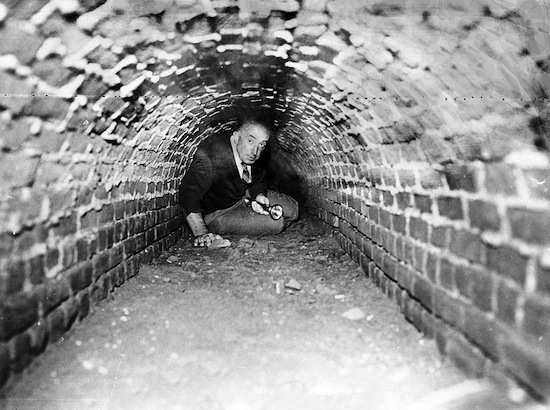Were you to ask for an expert to write a book about ghosts, you couldn’t hope for a likelier, living candidate than Roger Clarke. He grew up in a haunted house, joined the Society for Psychical Research at the age of 14, has written ghost stories and is the sort of talking head that often crops up, disembodied, lending gravitas to the knockabout ghost hunters that litter the bottom of our TV schedules.
This very handsome volume is not, however, a book about whether ghosts exist. It claims to explore what it is we see when we see a ghost. Sadly however, A Natural History of Ghosts is not what it claims to be: it is, in fact, more a stream of anecdotes, recalling both Charles Fort’s relentlessly paced works on the unexplained and the depth of research of Judith Flanders historical writing. The information rattles out, but lacking the former’s cheeky impartiality or the latter’s wry detachment. Instead, this is a very personal book marked by a mood of frustration and melancholy. Something akin to an obsessive compulsive’s feelings about hand washing, or a Toretteans’s take on his tics, Clarke is seemingly not interested in ghosts because it amuses or interests him, but because he has no choice. One supposes that Sisyphus could write a deeply informative book about his rock, but would it be any fun to read?
Fort’s book engages you after the fashion of a precocious, but awkward child – one who knows far too much about dinosaurs and hectors you to the point where communication is reduced to a litany of factual tedium. The level of knowledge is undeniable and contains the sort of detail that adds an expert’s depth to oft-told and sensationalised cases (such as The Enfield Poltergeist). This enriched viewpoint gives one pause and new insights on old stories. However, possibly this same surfeit of erudition is responsible for the book’s woeful lack of focus.
As with the title, the subtitle (500 Years of Hunting for Proof) is a misnomer: one feels, at no point, a sense of an argument forming in an attempt at anything like a framework of proof, or even belief – instead, a series of admittedly edifying essays on a number of underreported cases and other more thematically focused dissertations: ghost and war, ghosts and class (a subject on which the author has a healthily British obsession) and two whole chapters given over to a fairly puzzling discourse of ghost literature, which feels like a bit of a swizz.
Things move fast but we get nowhere and, as a reader, rather than the spectral touch it feels as though it is the all too familiar and everpresent hand of a publishing company at work in the formulation of this volume – pretending to be something a bit more sensational, a bit more “box office” than the collection of undeniably interesting musings from Clarke’s bottom drawer that this book, in fact, appears to be. These are occasionally spiced-up with crowbarred rhetorical frills – the cringeworthy trend of describing historical events in the present tense, for example – a practice which, rather than making his narrative feel more vital, actually leads one to question whether the writer knows what the word “history” actually means. The fact that Clarke switches from past to present tense in the same paragraph lead may leave sensitive readers feeling somewhat queasy.
These dispirit writings are arbitrarily called chapters and topped and tailed by incongruent and misleading conceit. The first of these frames the question of why it is we see ghosts – a question that is shrugged off in the last chapter in a fashion something close to contempt: if one doesn’t want to answer a silly question, it’s best not to ask one. However, it is not a silly question, it is an important and fascinating one and one that has been answered before and better by Professor Richard Wiseman in Paranormality: Why We See What Isn’t There.
A Natural History of Ghosts is a difficult book to like: a grumpy narrative from a writer seemingly trapped within his own head. Sentences and ideas trail off, the level of knowledge presupposed in the reader is as surprising as it is inconsistent, the fact that Henry James’s “The Turn of the Screw” was based on a story related to that author by the Archbishop of Canterbury is dropped in as though common knowledge, and the baffling mention of a “Cracknell & Mercury servants’ bell” is neither explained nor noted. A Google search of this term resulted in one hit, this very book; the publication of this review will, at the very least, serve to double that number.
There are, however sporadic, certainly highpoints to this book: the thoroughly fascinating history of spirit photography is worthy of a book all to itself and the tempo races as the dowdy, scholarly Monk’s habit is thrown off when Clarke retells, with salacious glee, the fabulously trashy story of the Borley Rectory , “The Most Haunted House in England".

Those seeking an answer – or an attempt to answer – the question that this book seemingly professes to pose will be disappointed. However, if one can remove the work from its unsuitable frame, and see this book more as a miscellany, it is possible to drift away on the stream of interesting facts and fancies; it can be enjoyed in the same way as the company of a frusty, but knowledgeable dinner guest. When the text is freed from the shackles of ill-advise hyperbole and glib dust-jacket sound bites, what you are left with is a rare thing, with a value all of its own, extrinsic to its subject matter: this is an insight into one man’s life’s obsession. When viewed like this, the air of frustration and regret, the clunky standoffish voice is understandable, perhaps even touching.
Is this what comes of dedicating one’s life to a thing that cannot be had or held? Is this the feeling of being a scholar of a subject that no one takes seriously? If there is a ghost that haunts this book, it is one that mournfully clanks its regret across the pages like Marley’s wraith, is of the ghost of a suspicious that there are no ghosts to prove.



